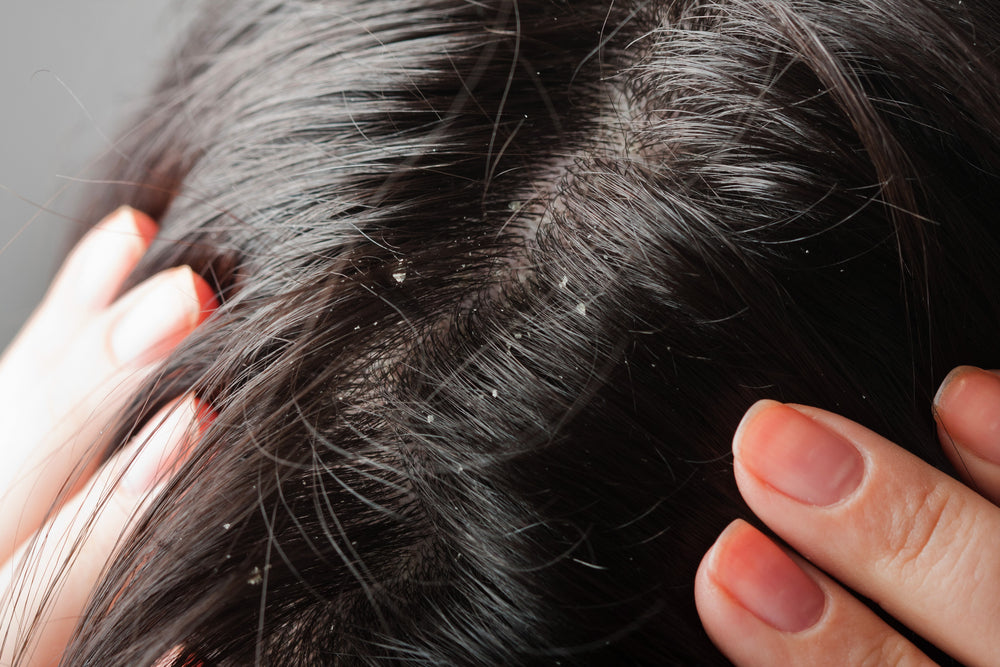Many struggle with flaky, itchy scalps despite trying out different hair care products. It can be especially hard to tell if scalp symptoms result from dandruff or dry scalp - two conditions that much resemble each other. I understand the frustration of dealing with scalp troubles. So, this article is dedicated to explaining the difference between two common scalp issues - dandruff and dryness. Read on to learn how to spot these conditions and take natural steps to restore your scalp.

Dry Scalp Vs Dandruff: Key Differences
While dry scalp and dandruff share various symptoms, there are still significant factors that can help you tell the difference. Then, once you know which condition is affecting your scalp, you can start to address the root cause to help your scalp recover.
Understanding Dry Scalp
Essentially, a dry scalp occurs when the skin on your scalp lacks the moisture it needs and becomes dehydrated. Various factors, including environmental conditions, harsh hair products, excessive washing, or certain medical conditions, can cause this. Also, some find that food allergies or deficiencies lead to sensitivity or dryness around the scalp and hairline.
The most common dry scalp symptom is the small, white flakes often mistaken for dandruff. However, unlike dandruff flakes, these are usually non-greasy and dry. Some more symptoms of a dry scalp include itchiness, redness and tightness. Additionally, scalp dryness isn’t usually caused by fungal or bacterial infections.
Understanding Dandruff
On the other hand, dandruff is a recurring condition that leads to excessive shedding of dead skin cells from the scalp. These flakes are very obvious and often appear throughout the hair and even fall onto clothing. While some environmental elements can lead to dandruff, the most common cause is the overgrowth of a fungus called Malassezia. In turn, this yeast-like fungus feeds on the natural oils produced by the scalp, leading to an accelerated shedding of skin cells. In some cases, Malassezia overgrows due to unbalanced scalp pH levels. For instance, harsh hair products and overwashing can make the scalp more alkaline, creating a favourable environment for certain fungi.
Another crucial difference between dandruff and dry scalp is the type of flakes they produce. In particular, dandruff flakes are often oilier and larger than those caused by dry scalp. What’s more, dandruff symptoms also include inflammation, bad scalp odour, and persistent itchiness.
Diagnosing and Treating Dry Scalp and Dandruff
As always, it’s essential to know exactly which condition you’re dealing with so you can get the best treatment. Dandruff and dry scalp confuse many, so you may find it helpful to see a dermatologist about your scalp symptoms. This way, they can examine your scalp properly and even perform tests to find out your underlying issue. Then, once you have an accurate diagnosis, you can begin targeting your symptoms with natural solutions and hair care methods.
Staying hydrated from within is one way to rehydrate a dry and flaky scalp. This is because drinking fluids regularly ensure your body receives the hydration it needs, allowing the skin to better retain moisture. Also, including omega-3 fatty acids in your diet nourishes your skin and scalp from the inside, ensuring it has enough nutrients to stay supple and hydrated. For instance, chia seeds, flaxseeds and walnuts are all rich in omega 3s, which also has a positive impact on hair strength and growth.
Applying aloe vera gel to the scalp is another way to combat dryness. This natural botanical can soothe and moisturise the scalp at the same time - restoring hydration to dry patches and calming itchiness. Alongside this, it’s also important to protect your scalp from harsh weather, such as extreme cold and heat. By wearing protective clothing such as hoods and hats, you can prevent your scalp from losing too much moisture and drying out due to the environment.

On the other hand, when treating dandruff, it’s best to look for natural solutions with anti-bacterial potential. One incredible natural solution is coconut oil, which can protect your scalp with its antimicrobial properties and reduce flakiness. This oil is also a wonderful remedy for dehydration, soreness and itchiness around your scalp.
Hair rinses are another effective dandruff treatment that can help balance your scalp’s pH. Diluting apple cider vinegar with lukewarm water is a simple hair rinse recipe that you can apply after shampooing. By doing this, you can gently restore your scalp’s natural acidity levels and minimise fungal overgrowths. Along with this, it’s best to avoid using strong chemical substances directly on your scalp, as they can worsen your dandruff symptoms over time.
Additionally, gentle scalp exfoliation with a soft brush or comb can help to remove dead skin cells and prevent follicles from clogging. This can reduce the amount of visible dandruff flakes in your hair and promote better scalp health.
Lastly, many find relief from their dry scalp and dandruff symptoms by incorporating a scalp oil into their hair care regimen. These oils include jojoba, almond or coconut and can be mixed with a few drops of essential oils for added benefits. Then, once the oil is applied directly to the scalp, you can gently massage it in, allowing it to infuse the scalp with moisture and nutrients. With this in mind, we’ve formulated an intensive scalp oil for dandruff, dryness, and other conditions. It’s a wonderfully rich yet non-greasy formula that can form part of your hair care, helping your scalp to heal naturally.
Dry scalp and dandruff are indeed difficult to tell apart. Still, I hope this article can help you differentiate them or encourage you to discover what’s troubling your scalp. Understanding the difference between these conditions is a crucial first step to helping you gain a healthier, flake-free scalp. Additionally, our selection of natural hair products is full of plant-based extracts to boost your journey to better hair and scalp health. Why not browse our reviews to learn how our customers have transformed their scalps and restored their hair with our natural solutions?